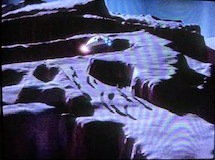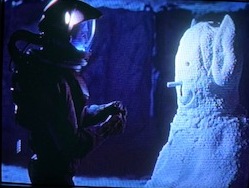|
Word Gems
exploring self-realization, sacred personhood, and full humanity
| How Big Religion and the world have created a concept of God in their own materialistic image. |
return to the main-page article on "God"
|
“I don’t have a life, I have a program.”

Star Trek: Voyager, episode "Tattoo" (1995)
|
Kes: “You really need more compassion for your patients. I wish you could experience pain, like the rest of us, for just once in your life.”
The Doctor, EMH (Emergency Medical Holographic program): “I don’t have a life, I have a program.”
|
|
On the Word Gems site, especially in the "Evolution" article, I've often quoted the work of these authors:
Augros & Stanciu's
The New Story Of Science
George Stanciu, PhD, theoretical physics
Robert Augros, PhD, philosophy
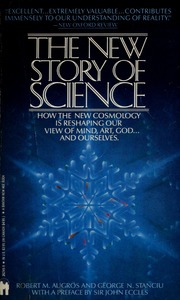
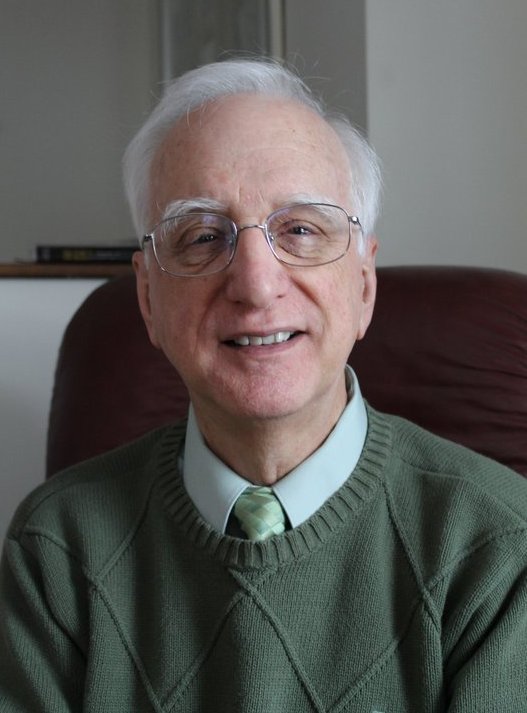 |
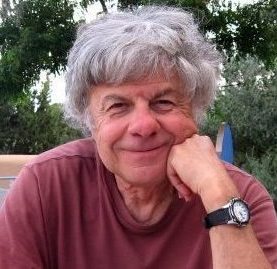 |
| Robert M. Augros |
George N. Stanciu |
I count “The New Story Of Science” as one of the five most important books I’ve ever read; so insightful is it, so seminal in its offerings.
Allow me to briefly summarize a major precept of this book as prelude to a discussion of the world's materialistic recrafting of "God."
old story
The “old story” of science revolves about matter as the basis of reality. This notion gathered much speed beginning in the High Middle Ages and into the Renaissance, propelled as a reaction against the superstitious and dogmatic teachings of the Big Mother Church. Thinking people, leading us to the birth of modern science, wanted no more of that heavy-handedness which had given us the Dark Ages.
But they went too far. Because Dear Mother Church had “poisoned the well” concerning knowledge production based upon a “pomp and revenue” hierarchy which presumed to know with infallibility, those of more enlightened views increasingly spurned anything having to do with nonmaterial origins.
To its credit, a materialistic paradigm of the universe took us quite far. Newton’s “Three Laws Of Motion” shot us from a cannon, all the way to the Moon and back. It worked pretty well – but, as would become clear, the "old story" operated credibly only within a narrow subset of reality.
new story
Then, more than 100 years ago, came Einstein’s relativity, followed quickly by Bohr and Heisenberg’s quantum mechanics. Suddenly all of physics found itself plunged into crisis as it was determined that the “cosmos of the very small” did not operate on the easy-to-understand principles of Newtonian cause-and-effect.
The fathers of quantum mechanics, in their dozens, now sternly preached a gospel of consciousness, not matter, as the ground of all being. See a long list of quotations to this effect. This is the "new story" of science.
What was materialistic science to do with this iconoclasm? It created “science wars,” a kind of split-brain with one camp of natural philosophers embracing the new quantum world and the other simply refusing to allow its implications to alter their particular branches of science. This “cold war” dichotomy exists to the present day.
The materialists were closet-haters of the quantum doctrine. What really rankled them was this emphasis on consciousness – it all seemed as something far too close to the old checkered teachings of Dear Mother Church. They wanted none of that.
However, they were, and are, guilty of “throwing the baby out with the bathwater.” Consciousness, fundamentally, has nothing to do with religion, but only authentic spirituality; and, with these two, n’er the twain shall meet.
materialistic science, beginning primarily with Descartes, changed the world’s view of what it means to be human
Galileo spoke of forces operating in the natural world. These forces caused objects to move in predictable manner. Newton codified it all with his famous “Laws Of Motion.” It was said that if all particles in the universe could be tracked, if their mass, speed, and direction could be known, then, it was asserted, one could accurately determine movement and vectors, even centuries into the future. This precept is called “determinism.”
The word “inertia” reveals some of this philosophy. Matter, it was posited, is “inert,” dead, and therefore cannot move itself. And if we find it moving, this means that some outside force has impinged upon it.
 Rene Descartes (1596 - 1650)
Rene Descartes (1596 - 1650)
Renaissance scientists began to make claim that everything is made of inert matter. Descartes tried to salvage certain subjective elements of what it means to be human. He said that people represent an uneasy amalgamation of mind and body.
man as machine
Let the church speak to the mind, he said, but science will rule on the material frame. As such, the body, he asserted, represents a machine. The body, made of matter, cannot direct itself and operates “deterministically.”
Later, however, science, taking more and more authority to itself, pushed religion to the side and proclaimed mind, along with body, to be a form of matter. This finalized the concept of “man as machine,” with no loopholes.
materialistic science’s view of mind as second-fiddle and bit-player is not so different from Big Religion's effort to make people believe they are defective and no-good
Let’s take inventory now and see where we are in this drama.
When a youthful Science in the Renaissance began to brashly assert that man is mere machine, with mind itself as just another form of inert matter, it’s not as if Science were sullying the pure virgin-reputation of what it means to be human; it’s not that human beings had been held in such high esteem with near-godlike dignity.
For many centuries, and also before that, for millennia, in the ancient world, Religion had done its best to convince the masses that they were no-good, conceived in sin and born under the wrong star, requiring remedial work and a total make-over; that, whatever god there may be, the unwashed rabble needed an elite, holier-than-thou priesthood as intermediaries before a wrathful divinity; that, god could never sufficiently love the uninitiated riffraff in the street to allow such into an eternal bliss, but for the interceding services of an ecclesiastical ruling class.
what does it mean to be human
Star Trek: Enterprise, season 1, episode “Breaking the Ice”
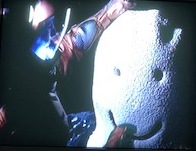
Having encountered a comet, an exploring Enterprise away-team lands on the 50 mile-wide block of ice and dust. Their first order of business is not to extract core samples but - to build a snowman.
the existential smiley face
What is it about human beings, light-years from home in the uncharted blackness of intragalactic space, that would prompt the creation of a rudimentary work of art with a smiley face?
Do machines predictably build snowmen, smiley-faced snowmen yet, in the midst of utilitarian duties while mapping a comet?
turning us into machines to be fixed, denying our capacity to choose our own course, minimizes the dignity of what it means to be human
An excerpt from the "Reincarnation" page:
|
Is Mankind free to choose, invested with true autonomy, able to chart one's own course, and therefore to be held responsible for deeds committed, or are we just broken machines, with faulty programming needing repair by an external agent, mere pawns of some controlling god or principle of nature, with no true culpability for what we do?
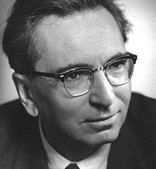
Viktor E. Frankl, Man’s Search For Meaning:
“I refer to what is called mysterium iniquitatis, meaning, as I see it, that a crime in the final analysis remains inexplicable inasmuch as it cannot be fully traced back to biological, psychological and/or sociological factors. Totally explaining one’s crime would be tantamount to explaining away his or her guilt and to seeing in him or her not a free and responsible human being but a machine to be repaired. Even criminals themselves abhor this treatment and prefer to be held responsible for their deeds.
"From a convict serving his sentence in an Illinois penitentiary, I received a letter in which he deplored that the criminal never has a chance to explain himself. He is offered a variety of excuses to choose from. Society is blamed and in many instances the blame is put on the victim."
In Dr. Frankl’s comments, we are confronted with a host of heavyweight concepts, each requiring much thought and discussion. Let us very briefly address some of these.
“helping” another person might quickly devolve to minimization of essential humanity
If people were just broken machines, then we could be taken to the shop for some external fixer to fix us. But we are not Cartesian machines, broken or otherwise; rather, we are individualized consciousness-units, led by what Dr. Sheldrake calls “morphic fields,” which are quantum fields of probability. This means we’re potentially capable of anything, good or bad. No external agent can fix us; we’re not to be fixed but, each for one’s own, must seek better levels of awareness. We have to self-create, self-direct, self-manage, and become our own “saviors.
our deeds "cannot be fully traced back to biological, psychological and/or sociological factors"
Do you know what this sounds like? In Newtonian physics we might speak of the “clockwork” deterministic universe. With full knowledge of the forces impacting a particle, we can predict, with great accuracy, its course, where it will be, at any point in the future. And this is quite true. However, materialists insist that humans are merely machines, a collection of particles, driven and led by forces of the universe, and, as such, are deterministic in nature, quite predictable, as anything else in the cosmos.
We expect this kind of talk from materialists, and have much to say about this errant view in the “Evolution” article, but we should be surprised to discover echoes of this metaphysical assumption, concerning a purported deterministic nature of humankind, from religious organizations. On one hand, they might speak of humanistic concepts such as “free will,” “made in the image,” guilt concerning sin, and other precepts suggesting humanity’s ability to choose; however, when we examine many of the chief, underlying-bedrock church doctrines, respect for human dignity evaporates, and we’re left with a knock-off brand of materialistic determinism.
Now we’re told that “we were born in sin,” that we’re marred by what Adam did – as if there were an Adam – that, essentially, we’re just broken machines, unable to direct ourselves, requiring an Outside Fixer to repair us. The dignity of what it means to be human, in terms of essential responsibility, is taken away. Their "infallible doctrines" report that we’re just pawns in a cosmic stageplay. We can’t chart our own course, we can’t right ourselves, we can’t direct our own lives through the ensuing eternities. We’re just broken machines, with no hope of refurbishing, unless some Outside Fixer does a complete make-over on us.
Editor’s note: But, as we discussed in the “Jesus” article, this doesn’t say much for the poor quality, the slipshod workmanship, regarding the Original Maker’s product. So, in order to avoid embarrassment, the tawdry implications, it’s popular just to blame the victim.
Our deeds "cannot be fully traced back to biological, psychological and/or sociological factors" because we're living-walking-breathing quantum fields of probability, enfleshed versions of Heisenberg's "uncertainty principle." We're not deterministic by nature. The "uncertainty principle" doesn't mean that it's really hard to predict but that it's impossible to predict with any accuracy.
the mysterium iniquitatis
This is quite interesting. I hope you’ll take a few minutes to explore it with me.
The Latin term, mysterium iniquitatis, is literally the “mystery of iniquity” or the “mystery of evil.”
Recall, if you will, discussions elsewhere concerning the nature of Big Religion’s doctrines. I’ve said that virtually any of their teachings, upon close inspection, especially the major foundational ones, have been designed to keep you dependent, servile, laden with burdens of fear and guilt. And this charge will suffer no degradation when we look at the mysterium iniquitatis.
It’s an old Latin phrase. And it can mean anything you want it to mean, depending on your view of God and the purpose of life. Dr. Frankl is a humanist. This means he believes in the dignity of human essence and potential. We are responsible, he says, for our own attitudes, for our course in life. We are not victims of what someone else did a long time ago. We are not pawns. We are not machines needing to be taken to the shop. We are endowed with awesome powers of self-creation.
In the hands of Dr. Frankl, the mysterium iniquitatis becomes, to the effect, “The origins of human malfeasance can never be entirely plotted and charted. We’re far too complicated for that kind of reductionism. You can’t reduce us to a formula, or a one-size-fits-all. Our capacity is altogether incredibly too grand for that kind of easy, one-trick-pony solution.”
This is what the mysterium iniquitatis means to the humanistic Dr. Frankl. But when it’s used by totalitarians, the cultish mindset, ever seeking new ways to enslave and incapacitate you, the mysterium iniquitatis becomes something very different. Now this Latin phrase is pressed into service to signify, to the effect, “Evil is a great mystery. It’s far too complicated for ordinary people to understand. You must allow God’s chosen servants to protect you from evil. And you’ll be doing this by obeying all the church laws and teachings. That’s what’s important.”
Anytime the Church doesn’t want you asking too many questions, they’ll call it a mystery, that it’s all unknowable. We’re reminded of the scathing judgment here by Father Benson:
the empty farrago of words
"The laws that govern the spirit world are not complex laws that none can understand. There are many things in spirit life which we cannot understand yet, just as there are many things upon Earth which cannot yet be understood... But [even now, before we understand everything] with all such matters, we can see plainly the reason for some law, or truth, or whatever it may be. [However] We are now treated to a farrago of words that collectively possess not one grain of meaning or sense, only to be told that it is a ‘mystery’, or something that under Divine Providence we are not meant to know."
Granted, the universe is filled with mysteries, and we’ll be exploring them for a very long time to come, but in this admission there is no pious defeatism of “oh, well, it’s a mystery, we’ll never know, and you shouldn’t even bother thinking about it.” This anti-intellectual approach is just bunk and meant to keep you on the plantation.
There’s a certain smell to everything the Church teaches. This is not hard to understand when we realize and admit that the Church is just one of the collective-ego institutions of the world, in business to do what egos do, which is to satisfy the cravings of “I don’t have enough” because “I am not enough.”
Editor’s note: It’s ironic that “mystery” should be applied to the subject of evil. As stated, there are many mysteries in the universe, but the essential nature of evil is not one of them. We know what evil is, all too clearly. See the extensive discussions on the meaning of “Evil.”
|
the typical church, for all its godtalk about soul and spirit, effectively sees people as machines to be fixed
You might wonder about this statement. The churches seem to be constantly talking about soul and spirit, about non-material things. How can we then claim that they’re purveyors of materialism?
It’s like this:
The churches, in the main, do not believe in the primacy of human spirit and mind. They do not believe in the awesome, sacred creative abilities of human potential. Instead, they preach that you are a broken machine; helpless, deterministic, and predictable, bouncing toward perdition, but for the remedial services of an elitist hierarchy.
Having constructed human beings in a materialistic image, it is but a small step to understand how theocrats, for many thousands of years, have, by extension, created a god in the image of their own ego-desires for power-and-control.
|
a materialistic spiritualism
Rabindranath Tagore (1861-1941) was Asia's first Nobel Laureate. Tagore was a Bengali polymath who reshaped Bengali literature and music. He spoke through the agency of Leslie Flint in the early 1960s.
“You are spiritualists as you call yourselves, knowing some aspects of the truth, but even then, even among the spiritualists I have been in contact with, especially since I've been here, I have been to various places where spiritualists congregate together and very seldom do I see any realization of truth in the highest sense.
attracting speakers, immature, materialistic, in their thinking
"It's all on a very low, material level, and in consequence they attract to themselves, many of them, souls who have very, made very little progress. Indeed many of them are very much the same as the people themselves. Indeed I would go as far as to say that generally speaking, spiritualism is not so much spiritual, it is very material, it is a very material conception of something which basically is spiritual. I mean it is very distressing.”
|
|
Augros & Stanciu quote Sir John Eccles and MIT Prof Joseph Weizenbaum on the quest for artificial intelligence.
"To speak of 'laws' or 'structure' of the mind is already to assume a material model."
“Computers and men are not species of the same genus.”
Because modern science sees man as machine, the acquisition of human consciousness is viewed as an emergent property, a natural consequence, of the advancing bio-complexity of homo sapiens.
Therefore, by logical extension, it is claimed, computers someday will “awaken” with a high degree of self-awareness after gaining more and more cyber-complexity.
However, the premise is errant.
We humans did not achieve sentience merely because our organisms grew in complexity. We have minds, consciousness, as an indwelling function of Universal Consciousness. Life itself derives from the latter.
Computers will never possess the kind of intelligence enjoyed by humans, no matter how complex they become.
|
|
the very architecture of church buildings reveals and supports power-and-control doctrines
I was watching a movie, the 2002 unaired tv pilot meant to reboot the 1960s “Time Tunnel.” I liked it quite a bit (and was dismayed that they decided not to create a new series for it).
A team of time travelers was sent back to 1944, World War II, to correct a “time-storm anomaly” that would affect the flow of time, thereby damaging the present.
The soldiers entered an ordinary country church in France, one that had been bombed.
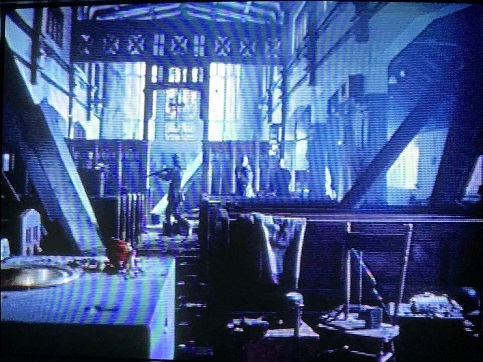

There was nothing remarkable about this church: merely a configuration of pews, situated before an altar, with lectern for the officiating clergyman.
However, I suddenly perceived something new amidst the well-worn familiar.
Dr. Kenneth Clark helped us understand that the art and architecture of history reveal the primary values of society

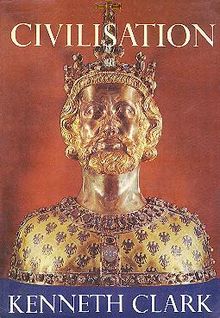
You’ll want to review a summary of Clark’s findings on the “Art” page as his insights are profound. However, for our purposes here, as I watched the soldiers enter the church, I suddenly saw more than pews and altar. I saw art and architecture pressed into service for the dysfunctional ego.
Editor’s note: This has been standard fare for many thousands of years. Also see the article “Weaponized Art: 30 Masterpieces Of The Ancient World.”
What does the layout, the architecture, of a church building tell us?
A church building could be structured, for example, along the lines of King Arthur’s “round table.” A round table for his knights would suggest that none occupies a chief seat, that all are equal, worthy, and important; all, each one, teaching each other, sharing what God has revealed to each person.
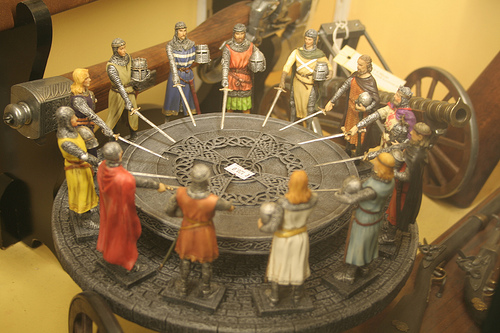
But the church on your street corner, or anywhere in the world, is not constituted on these egalitarian themes.
Church buildings enshrine, in their timber, bricks, and mortar, some very dark and counter-Renaissance concepts. The very architecture is designed to let you know who’s in charge, who’s worthy, and who’s not.
The pews silently speak to us, “Your job is to sit there and listen and be indoctrinated. Don’t say anything, because God doesn’t communicate with the laity, and so no one cares what you might have to say.”
The lectern-and-altar area – always elevated, of course – is where God’s hand-picked agent performs his mysterious formularies to make you right with an angry Deity upstairs. The speaker is the designated “Professional God-Man.” He's your defense attorney. When he speaks, all of you out there are to listen, and do nothing else.
the architecture of a church becomes indicator of God’s holy displeasure - with you
The structural dichotomy and demarcation between pew and altar did not happen by accident. This "great gulf transfixed" is purposefully designed to signify that there are two classes of people, a veritable caste system, in the kingdom of God. And you are meant to appreciate this ecclesiastical apartheid, which side of the line you're on, the moment you enter the building.
All of you out there in the unholy pews, out there in the vast unwashed hinterland, where God never walks or gets his hands dirty, are to be mindful of the fact that God could never love you enough to deal with you directly – you, born in sin and created under a cloud of perpetual guilt.
It is only via the good graces of God’s elite holier-than-thou clergy that Deity might consider you at all. And if you are to enter any form of afterlife blessing, the hierarchy wants you to know that you’ll make it only by the barest skin of your teeth.
all of this charade and showmanship issues as far cry from how the apostle Paul set up his churches
In Corinthians we learn that Paul encouraged everyone to share with the group a little something of how God had worked in his or her life the previous week. Everyone was worthy and important. This is so because, as the apostle John asserted, God teaches each one of us directly, individually, in an “intensely personal” way.
In order to accommodate the reality of these truths, a church, or a church service, would do well to be constructed along the lines of a circle. Think of the “round table.” There are to be no chief seats, no elites better-than-thou. God has no favorites kids. God teaches everyone, directly, and so we do want to know what you have to say about how God taught you, personally and individually.
|
“I don’t have a life, I have a program.”

We are not programs. We not only have, but are, life itself. We’re made in God’s image, and neither of us is so predictable.
We’re human beings with vast and uncharted potential. And human beings are not machines to be fixed but – well, we’re many things, and not so easily labeled; however, we’re – individual consciousness-units, or maybe, open and expanding quantum-energy fields, designed to reflect the Creator in an infinite number of ways.

|
Editor's last word:
Brief Restatement: "truth is a living thing"
Krishnamurti famously posited that “truth is a living thing,” and it’s living within you. And when we “go within,” we sense the vitality of this living essence.
This is the essential problem with the church and all of its teachings. They will never tell you that “the light is already inside of you” as the Gospel Of Thomas insists. With the Blackrobes, all solutions concerning some purported salvation are external to you.
And this is why it is correct to classify their doctrines as materialistic, part of this world, something outside of you.
|
|







